Tolerance To Incivility Linked To Greater Political Participation Online, Research Shows

In an era of increasing incivility in American political and public discourse, a new research has linked tolerance towards incivility to increased political participation online among college students.
Justin Knoll, a sociology doctoral student at the University of Arizona (UA), found that college students who are “highly tolerant to incivility,” are more likely to engage in commenting on political news stories or other such online avenues of political discussion or donate toward campaigns of candidates.
"We know, anecdotally, that communication on the internet can be nasty. It's anonymous, people say whatever they want to say, they do whatever they want to do and don't necessarily think about the consequences," said Knoll, who will put forth his findings in Montreal this week at the American Sociological Association's annual meeting, according to a news release Monday by UA.
"I was curious how that affects the way we choose to participate online, as online participation becomes this new avenue through which we communicate with our politicians, and they communicate with us," he added.
The research was based on data gathered by Robin Stryker, a sociology and law professor, who works with the UA's National Institute for Civil Discourse.
The data was collected through an online survey of 1,000 college students who were asked to rate 23 activities like shouting at a political opponent or attacking a political opponent’s stand on issues, on a five-point scale ranging from "not at all uncivil" to "very uncivil."
The respondents were then asked if they had, in the past 12 months, engaged in 13 different forms of online and offline political activities, ranging from commenting on a political story to attending a political speech or meet in person.
Knoll then used a standardized measure of tolerance developed by Stryker and her colleagues.
After controlling for factors like race and age, he found that respondents with a higher tolerance for incivility were significantly more likely to participate in five of the seven online forms of political engagement included in the survey; they were also more likely to donate and express support for a political candidate online.
The other two forms of online engagement that were not affected were sharing funny videos or cartoons and signing petitions.
According to Knoll, people with lower tolerance levels of incivility sought to avoid online activities where they may encounter such behavior.
Offline, this effect was not seen, except when it came to raising funds for a candidate or political party. Here individuals with higher tolerance levels of incivility were more likely to donate or solicit donations.
"I can't imagine you're going to encounter a whole lot of incivility when you're giving money to a campaign," Knoll said. "But I can imagine a scenario where you're soliciting money from folks and perhaps you're not getting the nicest things said to you."
The findings beg the question as to whether online political discourse, which is quickly becoming a major way we engage politically, is only for the thick-skinned.
"Those of us who are optimists about the internet see it as this leveling force that perhaps allows those without the same amount of access to resources or education to get involved in conversations that they might not have been having before," Knoll said. "Figuring out what affects people's decisions to go online and participate is extremely important."
"We found these trends on a college campus," he added. "Now the big question is: Are we going to find these trends on the national level?"
© Copyright IBTimes 2024. All rights reserved.






















